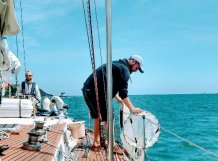Articles

A voyage of discovery
Sailors, scientists and artists
On two recent sailing expeditions, the University of Exeter collaborated with Sail Britain – an organisation with a mission of engaging with coastal communities through sailing, research and the arts.
The mission of the trips was to investigate the distribution of ‘microplastics’ in UK freshwater environments.
Microplastics are particles less than 1mm in diameter that enter the aquatic environment from several sources. Most beach visitors are familiar with the sight of plastic waste, such as washed-up bottles. Normally this waste originates from the land. Plastics are not biodegradable, so weathering and UV exposure cause it to fragment. Plastic enters the aquatic environment in other ways too: microbeads in toothpaste, face creams and cosmetics all contribute to the contamination of water. Microplastics in the aquatic environment are a real problem, with animals often ingesting the plastic. This can prevent them from consuming their natural prey, which can lead to starvation.
In the past, little work has been done in freshwater environments. Dr Kate Baker, Research Fellow from the Centre for Water Systems, - together with Dr Ceri Lewis and Nick Scott from Biosciences - studied the distribution of microplastics in the Norfolk Broads, the Helford Estuary and the Fal Estuary. They were joined by artists, poets and musicians on their own creative projects, using their environment as inspiration. Alongside the field work, the team enjoyed exploring remote creeks and mudlarking with Artist Tessa Grundon.
After the trip, Dr Kate Baker said “The wide range of backgrounds of the people on board really added to the breadth and depth of perspectives. The degradation of aquatic environments is a problem that is caused by the casual behaviour of all of us; these trips drew attention to that.”
Date: 30 August 2017
